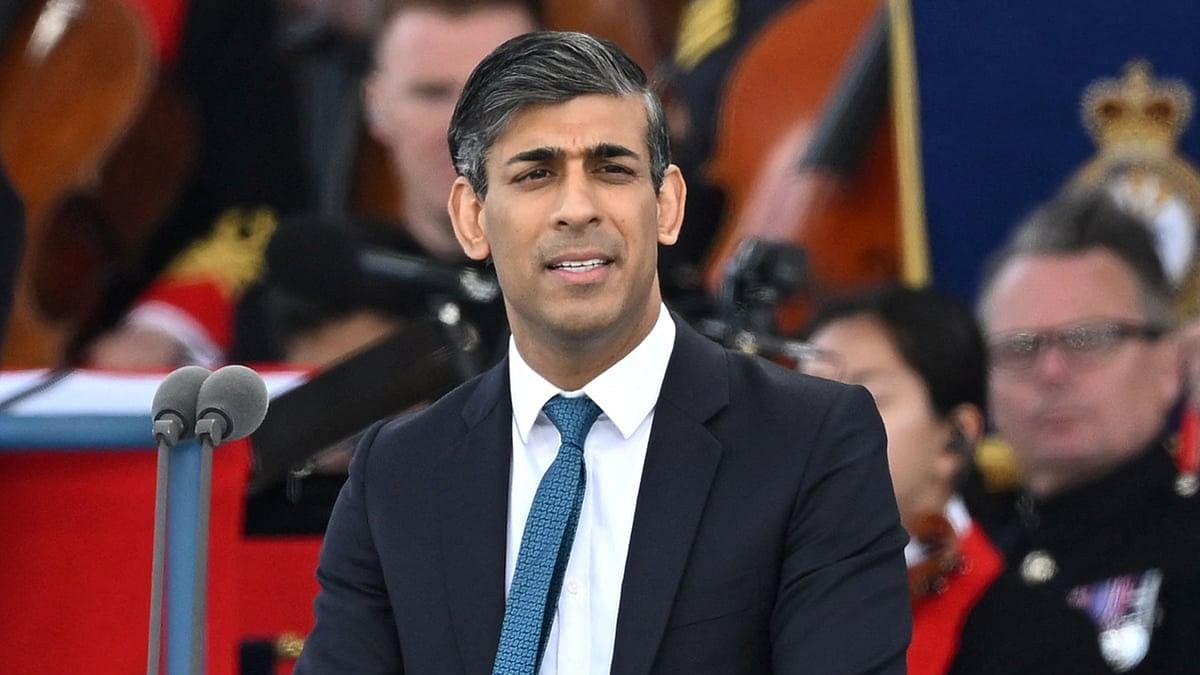
British Prime Minister Rishi Sunak
Credit: Reuters Photo
By Martin Ivens for Bloomberg Opinion
Echoing Ronald Reagan’s famous Pointe du Hoc speech 40 years ago commemorating the D-Day landings, President Joe Biden declared on Thursday that the heroes of Normandy who liberated Europe from the Nazis “knew, beyond any doubt, there are things worth fighting and dying for. Freedom is worth it. Democracy is worth it.” Does the younger generation know it today, and does Rishi Sunak, Britain’s youthful prime minister, get it?
Sunak clearly misjudged the symbolic importance of the 80th anniversary to Western solidarity, leaving the ceremonies early to record an election interview — a decision for which he has apologised, but which has done vast damage to his campaign.
Biden, perhaps the last instinctive Atlanticist in the White House, crossed the ocean to attend, joining King Charles III and French President Emmanuel Macron. Showing a better understanding of the sacred drama of politics, Labour leader Keir Starmer stayed to the end of the celebration, leaving the government represented by Foreign Secretary David Cameron.
Subsequent attacks on Sunak from Labour and the Liberal Democrats were predictable, but even Tories joined the chorus of disapproval. Craig Oliver, Cameron’s former communications chief, accused Sunak of “not getting what it is to be a prime minister.”
Outrage is the currency of modern politics, and lots of people gleefully scoring points against Sunak didn’t accept his leadership to start with. But even supporters would have to admit that, following his rain-soaked appearance outside 10 Downing Street to announce the general election, this gaffe is likely to provide one of the abiding memories of the campaign.
More interesting than the media storm is whether Sunak, aged 44, is representative of a younger generation for whom World War II has less contemporary resonance to the war in Ukraine. An opinion poll commissioned by the UnHerd political website would seem to confirm that; only 21 per cent of British parents would want their children to fight to defend their country, the poll revealed, and an overwhelming majority of 67 per cent would oppose their kids taking up arms.
When Sunak recently suggested reviving a modernized alternative to national service, the dominant response among youngsters was hostile, even sneering. They object to the prospect of their elders playing politics with their lives. Yet, as Biden reminded his audience in Normandy, the Russian army is battering at the gates of Kharkiv in Ukraine. North Atlantic Treaty Organization allies in Scandinavia, Poland and the Baltic states fear that it may be their turn next to face Vladimir Putin’s legions.
US presidents have long feared that their European allies are unwilling to pay the price that may be demanded in blood and treasure to defend their continent, but the UK is one of the few NATO members with near-continuous combat experience post-1945. Much depends on whether that’s a pattern that the Western alliance can rely on — or whether America’s once reliable British ally has lost its martial edge. Army chiefs struggle to recruit at all levels, and the Ministry of Defence has registered a drop of a third from 2020-2023 in hiring, especially for the air force. More people are now leaving the armed services than joining up.
Pessimists may note another straw in the wind — that the grown-ups in the room have joined younger Brits in taking a lackadaisical view of defense. When Sunak announced his national service plan, 61-year-old Starmer mocked it as a “Teenage Dad’s Army,” a reference to a vintage BBC television comedy about the ageing veterans who manned Britain’s Home Guard in WWII. Labour doesn’t have to agree with Sunak’s idea, but it was unwise to dismiss it in such callow terms, given that the nation’s security is about to become its problem.
The word “conscription” has ugly historical connotations - military service imposed on entire year-groups of young men who were given tasks they were often unable to perform. So any new iteration of the idea needs much better clarification and preparation to land well. Other European examples, from Nordic countries to Macron’s interest in introducing a form of national service in France, suggest that this isn’t the last we will hear of it.
UnHerd’s poll, moreover, suggests that attitudes are paradoxical. A majority want the UK to help Ukraine against its Russian aggressor, with many favoring a redoubling of the level of lethal aid. And, if recent history is any judge, the British won’t vote for pacifist leaders; Starmer’s predecessor, Jeremy Corbyn, signed his own electoral death warrant six years ago by arguing that Putin should be given time to investigate whether his secret services had used chemical weapons to murder a defector on British soil. For millions of working-class Labour voters, this was a prompt to defect to the Tories.
Starmer has received the message: He’s draped himself in the Union Jack flag ever since, and pledges his support for Britain’s armed forces and the UK’s independent nuclear deterrent. Moreover, national service isn’t just a Tory gimmick; Starmer’s Shadow Foreign Secretary David Lammy called for mandatory non-military service in his book Tribes, arguing that “if done correctly it would allow us to break down the divides that are entrenched in modern society. Women and men, black or white, poor or rich . . . would mix as equals.”
The bloodiest conflict on the continent since 1945 is raging and threatens to suck in the rest of Europe. The question is how to get a peacetime population, young and old, to face the fact that war may no longer be a misty memory but an imminent threat. The prime minister’s national service plan is one of the few Conservative proposals which have cut through to apathetic voters. More’s the pity that Sunak misread the moment on Thursday.